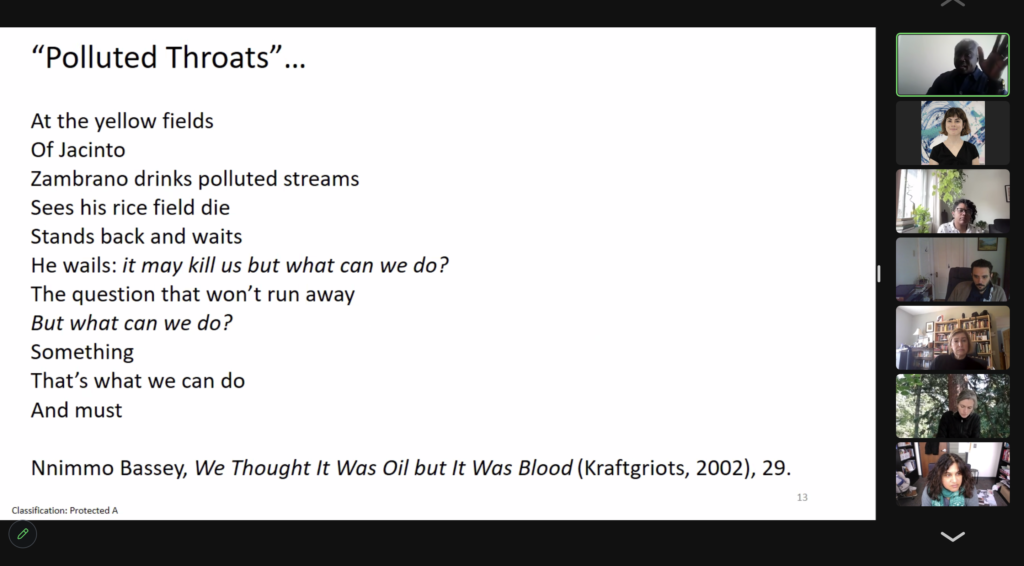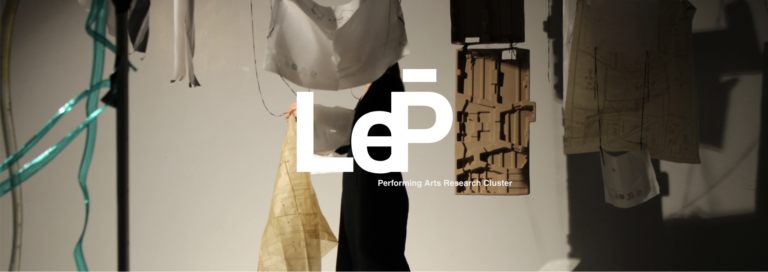In his recent presentation called Postcolonial Nature, Dr. Philip Aghoghovwia demonstrated how we are required to examine colonial and imperialist history if we are to understand our daily experience and relationship with nature in our current postcolonial context. To put it another way, one cannot discuss postcolonial nature without first discussing colonial nature. This lecture drew on vast African literature, including Karen Jayes’ debut novel For the Mercy of Water, Sarah Nuttall’s idea of pluvial time, Nigerian activist-poet Nnimmo Bassey, and South African author Etienne van Heerden. Focusing on water as a socio-material condition of people’s lives, he does not attempt to provide solutions for the ongoing ‘war against water’ in the continent. Rather, he aims to inspire alternative ideas of nature so as to reimagine a sustainable future both for nature and humankind.
Mostly focusing on the intersection of environmental and human issues, Dr. Aghoghovwia’s work is grounded in the postcolonial theories of Ramachandra Guha, Rob Nixon, Byron Caminero-Santangelo, and Cajetan Iheka. Taking a decolonial approach to what he calls the present-day war over water between public resources and private corporations, he is able to reveal its impact on ordinary life and society. His presentation provided a meta-narrative of the historical colonial atrocities and struggles that Africa continues to grapple with, including land-grabbing, the privatization of natural resources, and the displacement of locals under neoliberal regimes.
Dr. Aghoghovwia conveyed a sense of nostalgia and regret in the presentation, as well as the indeterminacy of mobility and the connivance of corporations and neoliberal policies that claim to serve the commons while actually displacing them. As a result, his talk lays bare the atrocities of colonial historicity indexed to water as a socio-material condition of people’s lives. Unlike the 19th and 20th centuries, when the war in Africa was about gold, platinum, and diamond, today’s war in Africa is about water as drought continues to impact parts of the continent. Despite the rhetoric of development practices in Africa that claim to uplift people by developing water infrastructure while employing its youth, locals have limited access due to exclusionary prices. When water is commodified and privatized in a way that opposes its primordial state as natural habitat, a price must be paid. The price that locals are forced to pay is displacement.
There are inherent contradictions in the water crisis: big corporations have captured water — supposedly a common heritage — only to profit from it. The interplay between postcolonial democratic ideals and neoliberal economic policies (that claim to uplift the commons but displace them through arrogant forms of conservation) is fundamentally antithetical. Dr. Aghoghovwia says it’s ironic that “…men, boys, and women fled, looking for work in the cities so they could pay for the water they helped secure”. In this system, displacement is the price a private company demands of the community. The concept of water as a commodity defeats the original purpose of nature and denaturalizes it, removing it from the lives of people. It is an attempt to claim power over nature. Water becomes a new site of power struggle and ecological well being is put at risk, demanding from us a closer examination and a dive into colonial historicity.

Lived realities, Dr. Aghoghovwia suggests, are characterized by a dynamic ecological system that is constantly evolving. Therefore, predetermined solutions to the water crisis would only stifle these realities, and would block us from more fruitful approaches. In its place, Dr. Aghoghovwia believes fiction writers like Jayes embody how there’s both beauty and discomfort in the contemporary postcolonial nature of Africa.“It’s less about finding a solution to this problem than it is about finding clarity in those contradictions,” he mused towards the end of his talk.
For Aghoghovwia, this claim to water is an example of the Anthropocene conniving with capitalism, and capitalism reinventing its power over nature, humans, and nonhumans. It causes displacement, water shortages, and land grabbing in Africa. Neoliberal frameworks and policies, masked by donor-driven development projects, serve to hide rather than reveal the contradictions of the Anthropocene. He asks us to think about what happens when water, a resource essential to the commons, becomes scarce, privatized, and commodified. Colonial nature commodifies objects, entities, beings, and concepts into tangible values that contradict their natural and primordial existence. That is why literature like Jayes’ dystopian novel For the Mercy of Water, helps us pay close attention to what it means to live through it as a result of this connivance.
Dr. Aghoghovwia’s talk was presented as part of the Critical Anthropocene Speaker Series: Global, Decolonial, Critical Race Approaches for a Multispecies World, a collaboration between the Critical Anthropocene Research Group (CARG), Colonialism Race and Indigenous Ecologies (CRIE), and Society, Politics, Animals and Materiality (SPAM).
By Amrita Gurung (PhD student in Social and Cultural Anthropology).
References
Is the Anthropocene Conniving with Capital? Water Priva(tiza)tion and Ontology Reimagined in Karen Jayes’ For the Mercy of Water.” Interventions, 24:3 (2022). https://doi.org/10.1080/1369801X.2021.2015704



